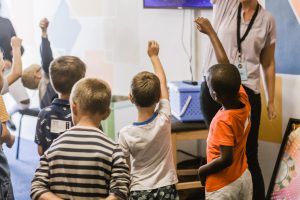
November 13, 2019, by Rupert Knight
Tuning in to expert teachers: seeing beneath the surface of classroom practice
In this post, Rupert Knight considers what we mean by teacher expertise and how we might get better at looking for this in action.
Speaking in an October 2019 article in the TES about the current upsurge of interest in evidence-informed practice, Mel Ainscow advised caution in the use of evidence by teachers, arguing that:
‘It gives the idea that there are simple, off-the-shelf solutions for complex problems. It also disregards the expertise of the teachers. You have to start from what’s there.’
The value, but also limitations, of evidence in forming practice have been considered in a previous blog in this series, but it is notable that Ainscow used the term ‘expertise of the teachers’. What exactly is teacher expertise and do we know it when we see it?
Professional judgment and evidence
We might expect a specialised body of knowledge to be one of the hallmarks of any profession. Certainly codifying practice in the form of, for example, standards for teachers or aspects of inspection criteria, would suggest that there are commonly accepted benchmarks for teacher performance. This is not without controversy, however. As argued by Donald Schön, Education is a profession characterised by uncertainty, in which expertise is often less about implementing universally agreed principles than about skilfully applying professional judgment in the midst of practice. Evidence, however, has an important place in informing this judgment. Findings presented for teachers in research summaries such as the guidance reports from the Education Endowment Foundation are increasingly prevalent and offer useful general principles for the classroom. Some popular, evidence-informed lists of strategies, such as those on memory or ‘instruction’ may be in danger of implying a narrow view of learning as simply about the retention of facts, but these and many other sources of evidence are potentially valuable when taken as part of a broader picture. Nevertheless, teaching is not given to recipe-like solutions. Teacher judgment – often tacit and sometimes seen as ‘practical wisdom’ or ‘craft knowledge’ – remains an essential feature of expertise.
So what does expert teaching actually look like day-to-day in the classroom?

The expert teacher in action
David Berliner (2004), over the course of three decades, carried out in-depth studies of expert teachers’ practice seeking to capture and define expertise in teaching. His research is summarised in this paper as well as other earlier publications.
As well as having the extensive pedagogical content knowledge and passion for teaching that we might expect, Berliner suggests that experts have other attributes, including the insights that they:
• Have developed automaticity for routine tasks, allowing them to pay more attention to the deeper structure of the learning taking place;
• Can process and interpret many cues simultaneously, but give their attention to a small number of significant concepts such as ‘working’;
• Recognise patterns and can readily discern what is atypical in a lesson scenario;
• Are sensitive to emerging situations, and capable of being opportunistic and flexible;
• Monitor learning and respond well to individuals;
• Are able to make assumptions, predictions and hypotheses about what will happen in lessons
What can be seen here is that this is about different ways of thinking, rather than simply having more experience and knowledge.
The trouble is that many of these attributes are context-dependent and involve subtle forms of perception and decision-making that are inherently difficult to perceive in action. Indeed, Berliner points out that expert teachers may not be the best mentors or coaches, as so much of this expertise has gone beyond even intuition to become arational and difficult to articulate. He does, however, suggest that a key contribution of experts is their modelling of practice.
Using such teachers as models requires a highly attuned form of noticing that goes beyond the familiar checklists used by novices looking for more overt features of practice.
Tuning into expertise
So, if expertise is based largely on the interaction of the teacher and the environment, what should we be tuning into in an expert teacher’s classroom?
At one level, Tony Eaude (2012) suggests we might focus on how experts do ordinary things well. What adverbs might be added to these everyday classroom activities, for example, when we see an expert in action?
– observing…carefully
– listening…?
– talking…?
– questioning…?
Going beyond this, noting expertise involves a sophisticated and challenging form of observation. I would suggest as prompts the following questions, any one of which might be a focus in its own right for a lesson observation. Each one seeks to draw attention away from the superficial and towards the deeper structure of a lesson.
• To what extent does this lesson appear to be following, or deviating from, a pre-determined route? What are the moments of deviation and what triggers them?
• Which emerging opportunities (e.g. unanticipated pupil responses) are engaged with and built on by the teacher and which are not?
• What are the moments of ‘in action’ decision-making? What has prompted this and what might the alternative decision have been?
• At different times, what ‘concepts’ within the learning process (e.g. participation; collaboration; on-task behaviour; independence, etc.) seem to be the main focus of the teacher’s attention?
• How does this teacher use positioning and movement within the classroom to maintain their awareness of all learners?
• When and how does the teacher monitor and respond to learners at an individual level?
• Are there examples of when the teacher’s response seems to be built on prior knowledge of the learners? What knowledge might the teacher have of the pupils and teaching environment in order to respond in this way?
• Which parts of a lesson or procedures in this classroom seem to have become automatic and routine for the teacher?

Working with significant moments
What you will notice is that much of the above is geared towards the identification of specific moments within a lesson – significant but often subtle – which can form the basis of subsequent discussion. In some ways, identifying them is similar to the process of seeking ‘critical incidents’ outlined by David Tripp (Tripp, 1993). A focus on these specific moments or incidents may help in any post-lesson discussions: prompting expert teachers to articulate the implicit decision-making behind their actions is a notoriously challenging task.
In this September 2019 article specifically on primary teachers, Eaude echoes Berliner’s argument for studying cases. These instances of common classroom situations and an expert response could gradually form a set of prototypical examples on which the less experienced teacher can draw. These cases might then be analysed further for their links to more generalisable principles and it is here that research evidence might also play a part as we consider what additional light this sheds on events and how they can be reinterpreted.
It would be great to read your views on expertise and the contributions of evidence and judgment.
Questions for consideration:
• What other indicators of expertise in practice might be identified through observation?
• Berliner suggests that teachers’ expertise tends to be domain-specific. To what extent, therefore, might teachers in different age phases differ in their expertise?
• What questions should the novice be asking the expert about their practice?
Berliner, D. (2004) Describing the behavior and documenting the accomplishments of expert teachers, Bulletin of Science, Technology & Society 24(3): 200-212.
Eaude, T.(2012) How do expert primary classteachers really work? St Albans: Critical Publishing.
Tripp, D. (1993) Critical incidents in teaching: developing professional judgement, Abingdon: Routledge.

Very interesting read. Teaching evidence and data collection can be considered highly significant in an international context, where teacher turn over rates can be fairly high due to several factors. This may provide the new teacher with various strategies that have successfully worked in a certain classroom with certain students, that may lead to easy transitions into their new roles. However, the evidence based approach may also bring with it certain biases which may lead certain perceptions to continue without approaching these matters with a fresh perspective. I therefore agree with your thought that “teaching can not be given into recipe-like solutions”. Though the previous point is more related to student data and highlighting learning practice that works for them, evidence gathered through observation is more practice related, and analyzing teacher expertise through observations can provide with ways to improve and improvise teaching practice based on using current classroom situations and transforming them into learning opportunities.